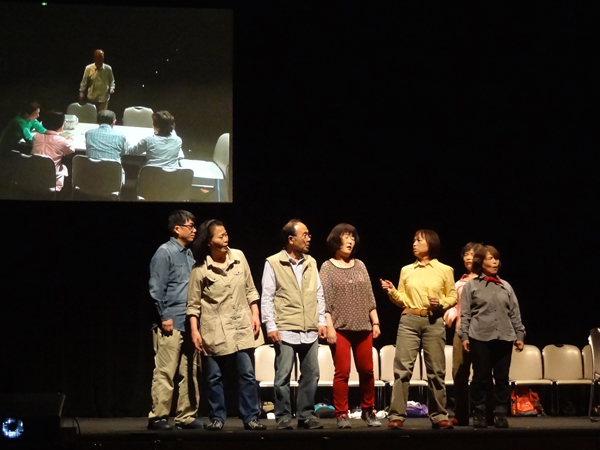
Takatsuki Senior Gekidan theater company “Soyo Kaze Pedal.”
Moro-moro, Uro-uro
(from Senior Theatre Festival in Sendai)
(Jun. 6, 2015 at Hitachi Systems Hall Sendai)
Moro-moro, Uro-uro

Leader of Performance arts group dracom

Takatsuki Senior Gekidan theater company “Soyo Kaze Pedal.”
Moro-moro, Uro-uro
(from Senior Theatre Festival in Sendai)
(Jun. 6, 2015 at Hitachi Systems Hall Sendai)
The setting for the play is the meeting room of an amateur mountaineering club. In the center of the room is a large meeting table and chairs, on the back wall is a screen and below it are a row of chairs is set up for the characters to sit on while waiting for their turns to make their appearances. (All of the characters essentially remain on stage throughout the play.)
One of the mountaineering club members, Masao Fukazawa, appears on stage and checks the setting of a video camera at the back of the room. With his back to the audience, he faces the camera and begins to speak into it, as if making an entry in a video diary. From here on, Fukazawa remains on stage as an invisible presence to the other characters as he continues to make entries in his video diary, which appear as live images on the screen at the back of the stage.
[Video footage] Fukazawa announces that for the first time he is going to go mountain climbing alone on the 9th of March, 2011.
The scene shifts to two days after Fukazawa goes missing in the mountains. The other members of the club have done out climbing in groups of three to five in search of evidence about what has happened to Fukazawa and are reporting back to each other by text messages or phone that they have been unable to find anything. Just then, the earth quakes in great tremors.
A month later. Fukazawa remains a missing person. At the club’s meeting room Fukazawa’s younger sister Kumiko and the landlord, Nioka, are talking with newspapers spread out in front of them. The papers are full of articles about the Great East Japan Earthquake and Tsunami and the many missing people whose bodies have not been found or identified. Other members of the mountaineering club return to the room. Again today, they have been out searching the climbing course that Fukazawa was supposed to have taken.
[Video footage] Fukazawa records in his video diary that it was a day when he was feeling irate because he lost money playing Pachinko, and after drinking he met the mountaineering club member Azuma at the river and made a drunken promise to go mountain climbing.
The scene is a bus stop where four female members of the climbing club are talking as they wait for the bus on the way home from another day of searching for the missing Fukazawa. They talk about feeling guilty for searching for a sole missing friend when the number of missing persons from the Great East Japan Earthquake and Tsunami is still in the tens of thousands. Fukushima says, “Not knowing what to do with these emotions, I think too much until my mind goes numb.” The other three, Nezu, Yamaguchi and Aida all agree that their minds go numb too, and it causes them to make mistakes in the simplest of daily tasks.
Back in the club meeting room, Yoshida, who once lost two friends in his college mountaineering club that were never found, says to Azuma, “I still feel that I am climbing together with them in my mind,” ever on a quest to reach a place higher than any other.
On another day, the members of the mountaineering club have gathered at their meeting room and are trying to play some videos taken by the club in the past, but no one is good with electronic devices and they can’t get the video to play. Kumiko arrives and manages to turn the video player on, but what begins playing is her brother Fukazawa’s video diary.
[Video footage] February 22, 2011. On video, Fukazawa tells the story of how his marriage failed and he went off to live alone in a small 40,000 yen-a-month apartment. There he lived the lonely, austere life of a single man. His younger sister, Kumiko, kept scolding him, telling him to get hold of himself and being living life positively again.
In the video diary there was also footage in which Fukazawa appeared to be practicing dance steps. A notebook of things Fukazawa had written with the intent of including in his video diary was also found. In it were written the words, “I’m truly grateful to all of you,” and it also contains notes about his dance that was eventually never recorded.
Imakura suggests that it must have been a dance he was planning to dance with someone. Encouraged by Murakawa, who has some experience doing jazz dance, they all begin practicing a dance routine with the intent of realizing Fukazawa’s wish.
The music they choose at the recommendation of Imakura’s eldest son is “Road to Nowhere” by Talking Heads. Someone notes that the lyrics say we’re on our way to a place no one knows. “It’s a song about adventure, isn’t it?” someone adds. “Shall we sing, “Let’s go together merrily to heaven?” adds another. Watching the image of Fukazawa in the video, the members smile at each other as they say, “Let’s go to heaven together.” Yoshida says that dancing has made him feel that he understands what made Fukazawa want to dance.
[Video footage] In the video, Fukazawa says that he wanted to leave this video as proof that he had lived. But, since he didn’t have the confidence to write words that he could leave as an “ending note,” he had decided to make an “ending video.”
All of the members of the club take their positions, face the camera and begin to film the final take of their dance.
—Nothing has been solved regarding Fukazawa or the tragedy of the great earthquake and tsunami. But, by dancing they have come a step closer to finding a place where they can lay the anxiety of their loss to rest and carry on with their lives. The two can be considered one and the same, or they can be thought of as separate things altogether. But, the important thing is that both must never be forgotten.
After the dance, Kumiko says that she wants to join the mountain climbing club, and the members all welcome her with open arms as the curtain falls.
Related Tags